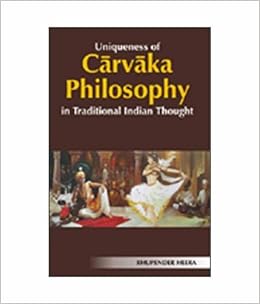Carvaka Philosophy Pdf
Lokayata/Carvaka—Indian Materialism In its most generic sense, 'Indian Materialism' refers to the school of thought within Indian philosophy that rejects supernaturalism. It is regarded as the most radical of the Indian philosophical systems.
Nov 15, 2012. Journal of Indian Philosophy. By the tenth century, so much so that in the fourteenth century Sāyaṇa-Mādhava aka Vidyāraṇya could categorically declare that the Cārvāka/Lokāyata upheld causality, not chance. Cārvāka/Lokāyata first cause kāla Medical compilations Sāṃkhya svabhāva yadṛchhā. Theory of Knowledge in Charvaka Philosophy, Indian Philosophy - Download as Text File (.txt), PDF File (.pdf) or read online. Indian Philosophy.
It rejects the existence of other worldly entities such an immaterial soul or god and the after-life. Its primary philosophical import comes by way of a scientific and approach to metaphysics. Thus, it rejects ethical systems that are grounded in supernaturalistic cosmologies. The good, for the Indian materialist, is strictly associated with pleasure and the only ethical obligation forwarded by the system is the maximization of one's own pleasure. The terms Lokāyata and Cārvāka have historically been used to denote the philosophical school of Indian Materialism. Literally, 'Lokāyata' means philosophy of the people.

The term was first used by the ancient Buddhists until around 500 B.C.E. To refer to both a common tribal philosophical view and a sort of this-worldly philosophy or nature lore. The term has evolved to signify a school of thought that has been scorned by religious leaders in India and remains on the periphery of Indian philosophical thought. After 500 B.C.E., the term acquired a more derogatory connotation and became synonymous with sophistry. It was not until between the 6 th and 8 th century C.E. That the term 'Lokāyata' began to signify Materialist thought. Indian Materialism has also been named Cārvāka after one of the two founders of the school.
Cārvāka and Ajita Kesakambalin are said to have established Indian Materialism as a formal philosophical system, but some still hold that Bṛhaspati was its original founder. Bṛhaspati allegedly authored the classic work on Indian Materialism, the Bṛhaspati Sῡtra. Diccionario Critico De Dudas Navarro Pdf Writer Corporate Seal Stamp Template Printable. on this page.
There are some conflicting accounts of Bṛhaspati's life, but, at the least, he is regarded as the mythical authority on Indian Materialism and at most the actual author of the since-perished Bṛhaspati Sῡtra. Indian Materialism has for this reason also been named 'Bṛhaspatya.' Table of Contents • • • • • • • • • • • • • • 1. History Traces of materialism appear in the earliest recordings of Indian thought.
Initially, Indian Materialism or Lokāyata functioned as a sort of negative reaction to spiritualism and supernaturalism. During the 6 th and 7 th centuries C.E. It evolved into a formal school of thought and remains intact, though consistently marginalized. Vedic Period Vedic thought, in the most comprehensive sense, refers to the ideas contained within the Samhitas and the Brāhamaṇas, including the Upaniṣads.
Historians have estimated that the Vedas were written and compiled between the years 1500 B.C.E. And 300 B.C.E. It is difficult to point to one philosophical view in the Upaniṣads, at least by Western standards; however they are considered by scholars to comprise all of the philosophical writing of the Vedas. The Vedas exemplify the speculative attitude of the ancient Indians, who had the extreme luxury of reflecting on the whence and whither of their existence.